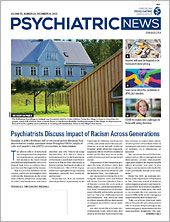At its virtual meeting last month, the AMA House of Delegates approved policy advocating for widespread adoption of telehealth services by physicians and physician-led teams beyond the COVID-19 pandemic.
The resolution was one of dozens of new policies on public health, physician practice and payment, and medical education adopted by the House. Among those was a resolution outlining principles for protecting residents when the institution where they are training closes (see box below).
The resolution on telehealth calls for the Centers for Medicare and Medicaid Services (CMS), other federal and state agencies, and the health insurance industry to provide equitable coverage that allows patients to access telehealth services whether at home or elsewhere.
Testifying on the telehealth resolution, Theresa Miskimen, M.D., an APA delegate to the Section Council on Psychiatry, cited a recent APA poll showing that 62% of Americans are experiencing more anxiety now compared with this time last year (see
Psychiatric News).
“We know that we need mental health and substance use treatment more than ever,” she said. “APA supports permanently maintaining a number of the telehealth flexibilities that have been implemented. We also support Congressional action to remove the geographic restrictions.”
Maintaining telehealth flexibilities beyond the pandemic will “ensure a smooth transition to in-person care and increase telehealth access.” Such access, she said, “is especially important for mental health and substance use treatment, where the ability to establish and maintain a strong, uninterrupted therapeutic alliance with patients is critical to ensure effective interventions for all payors.”
Delegates also approved a report by the AMA’s Council on Science and Public Health calling cannabis “a dangerous drug and … a serious public health concern” that should not be legalized. The report says that states that have already legalized cannabis (for medical or adult use or both) should be required to take steps to regulate the product effectively to protect public health and safety.
“There is no current scientific evidence that cannabis is in any way beneficial for the treatment of any psychiatric disorder,” testified APA President-elect Vivian Pender, M.D. “In contrast, current evidence supports, at minimum, a strong association of cannabis use with the onset of psychiatric disorders. Adolescents are particularly vulnerable to harm, given the effects of cannabis on neurological development.
“Further research on the use of cannabis-derived substances as medicine should be encouraged and facilitated by the federal government,” Pender said. “The adverse effects of cannabis, including, but not limited to, the likelihood of addiction, must be simultaneously studied.”
The possibility of enactment of a “public option” in the next administration was the source of vigorous debate. Delegates adopted a report of the Council on Medical Service stating that the “primary goals of establishing a public option are to maximize patient choice of health plan and maximize health plan marketplace competition.”
The report delineates these other AMA priorities for any public health option:
•
Eligibility for premium tax credit and cost-sharing assistance to purchase the public option should be restricted to individuals without access to affordable employer-sponsored coverage.
•
Physician payments under the public option should be established through meaningful negotiations and contracts and not be tied to Medicare and/or Medicaid rates.
•
Physicians should have the freedom to choose whether to participate in the public option.
•
There should not be subsidies for public option that give it an advantage over other health plans.
Six months after the killing of George Floyd at the hands of Minneapolis police, Delegates debated several resolutions around racial bias and adopted new policy calling racism “a threat to public health.” The policy requests the AMA to identify a set of best practices for health care institutions, physician practices, and academic medical centers to address and mitigate the effects of racism on patients, international medical graduates, and other health care professionals.
Dionne Hart, M.D., an alternate APA delegate to the House of Delegates, spoke to the House about the effect of police brutality on public health. “According to a 2019 report from the U.S. Department of Justice Bureau of Justice Statistics, Black residents are more likely to experience both street and traffic stops,” said Hart. “The presumption of threats by officers increases levels of chronic stress among minority populations who are impacted by these volatile police interactions. Black Americans are three times more likely than White Americans to be killed by police and account for over 40% of victims of police killings nationwide. In this past year alone, 1,020 Black people have been shot and killed by police. Black men are especially likely to be imprisoned. Black Americans have lived with these risks that were largely ignored while community leaders with the power to make a change, including members of law enforcement, have dismissed or ignored these real concerns.”
Hart is a member of the APA Council on Government Relations and AMA representative to the National Commission on Correctional Healthcare. ■
Resolutions and reports approved by the AMA House of Delegates are posted
here.

